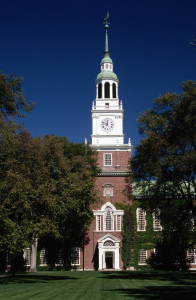As seniors prepare to graduate and say so long to Dartmouth, it seems fitting to examine to some extent what their four years of tuition, and for a few, more than that, actually bought. The educational advancement that the College provides should be obvious to any graduating customer. They, or their parents, know how much they have learned over the last four years. Each graduating senior also knows the position of employment they will soon hold, or the lack thereof. Given this it seems opportune to discuss the other thing that student tuition, along with whatever other money can be fleeced from students via Dartmouth Dining Services or other fees, actually pays for: administration. According to Dartmouth’s filings as a non-profit, the College employs approximately 2700 non-Geisel employees. A filing from 2012 suggests that about 60% of those employees work in the following areas: “Advancement,” Dean of the College, Finance and Administration, the President’s Office, and a concentration of employees in the Provost’s Office. For comparison, there are, on average, only about 4200 undergraduates attending Dartmouth, so there are two employees for every three students at Dartmouth. Only 600 of all of Dartmouth’s employees are tenured or tenure-track faculty, including the graduate schools. These facts and figures can only go so far to describe the administrative situation at Dartmouth whereas personal experience can normally do more to illustrate it. In the last few weeks I have had a personal experience with a small portion of Dartmouth’s administrative bloat that exemplifies a common student experience.
On campus I work as a Study Group Leader in Economics. The position is reasonably well paid for a campus job and allows me to practice important skills and refresh important knowledge related to my major. In order to get paid, like many other Dartmouth employees I fill out a time card online, recording the hours worked, what time they were worked, and what job I performed during them. If there is a mistake in the electronic timecard by the end of a two week pay period, then I have to fill out a paper timecard and follow the process to get it amended. Because of a miscommunication over whether I billed for preparation time between myself and the College, I got to follow this process and experience for myself the mire that is the College’s administrative branch.
First, I went to the library, second floor Baker to be exact. There, I met with three different women, each of which tried to help me fill out a form that was not self-explanatory. As it turns out, despite such a large bureaucracy, individual employees’ roles are not clearly defined. No one person has the job of helping students with the paper timecard, a relatively frequent task. It is worth pointing out that the office that I went into probably has enough space for twenty or so workers at typical office spacing, and many more if they were to squeeze in like the Capitol Hill office I worked at. It appeared however that the office was nearly abandoned when I entered at around 1:00 pm in the middle of the week. The person whose signature I needed did not come into the office for about half-an-hour. When asked why the process was the way it was, an employee responded by saying “to discourage people from having to fill out paper timecards.”
I later went to 7 Lebanon Street in downtown Hanover. This pristine location is occupied by the Payroll Office among other organizations. The Payroll Office was closed and abandoned at 3:10 PM, when I arrived. This is policy as the office is only open 25 hours per week. After further enquiry I was informed that all employees in this office are full time employees, and work nowhere else but the Payroll Office.
I dropped off my signed form and headed downstairs to ask about typical hours for the organization. After a brief and pleasant conversation with several more staffers, excited to soon be able to head out for the day, I noticed something. Every single administrator that I had talked to or seen was a woman. The journalist in me did not hesitate to pursue the intriguing fact further. A few questions later and I left the office with a list of names of old and new administrators in the Payroll Office and the Human Resources Office as well as confirmation that neither woman working the front desk could think of a single male employee in either office.
At the end of my journey I learned many things. I learned that Dartmouth administrators are almost exclusively women. I learned that these administrators have very little work to do without clear roles assigned to them. I even learned that some administrative procedures exist merely to try to make students lives more difficult and time consuming. I also confirmed many of the stories I have heard from my compatriots. Two different close friends have recounted horror stories from the Financial Aid Office to me. Specifically, each student had to explain to the employee how to do their job. Enough scholarship students go on LSAs and FSPs that you would think that the Financial Aid Office would be aware by now of the rules surrounding those trips. Apparently not. As my journey through a small portion of the Dartmouth administration came to an end, so too does the journey of many seniors through Dartmouth. Our graduating friends get to look back on their four years fondly. Their donation to many unnecessary administrators continued employment is much appreciated. I am sure.

Be the first to comment on "Dartmouth: A Bloated Bureaucracy"